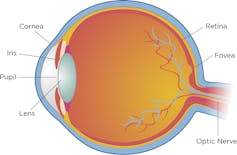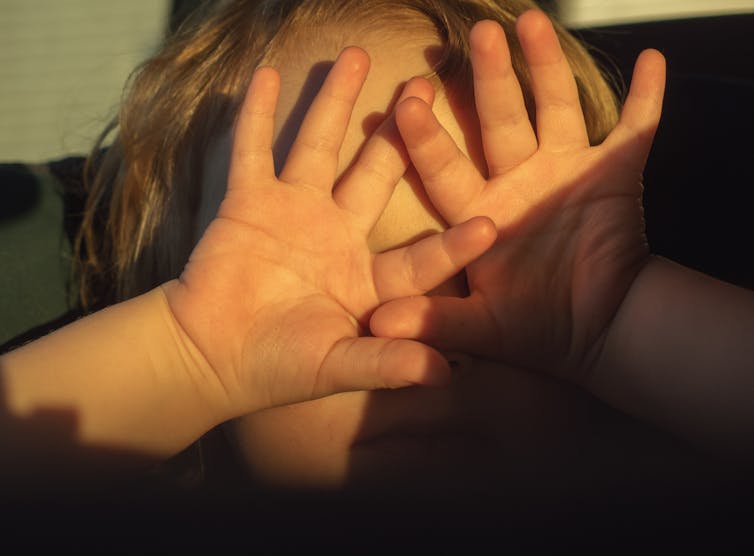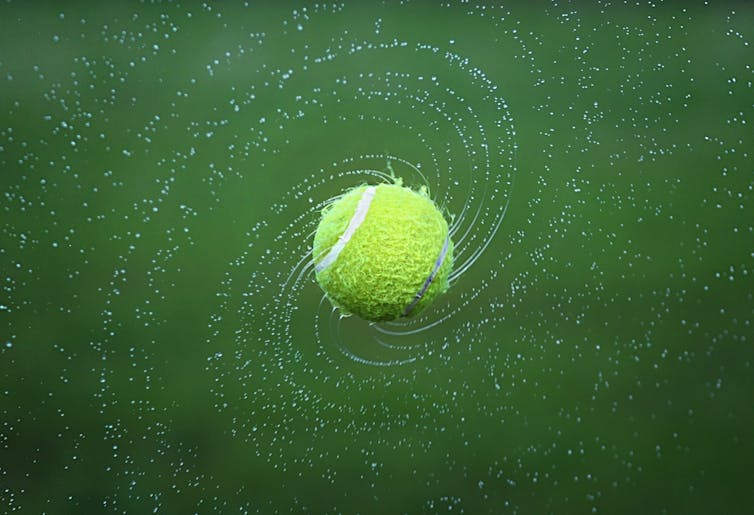Why do you blink when there is a sudden loud noise close by?
- Written by John Furness, Academic, University of Melbourne
This is an article from Curious Kids, a series for children. The Conversation is asking kids to send in questions they’d like an expert to answer. All questions are welcome – serious, weird or wacky! You might also like the podcast Imagine This, a co-production between ABC KIDS listen and The Conversation, based on Curious Kids.
Why do you blink when there is a sudden loud noise close by? – Angus Graveson, age 8, Hobart.
When a noise surprises us, our eyes blink without us even realising. It happens unconsciously, without us telling our brain to do it.
This is called a blink reflex. It has an even longer name, actually. We call it “the acoustic startle-reflex eye blink”. The blink happens especially fast - in about a hundredth of a second – so you don’t have time to think about it.
Humans have developed this reflex over many years because it has helped us keep our eyes safe and that has helped us survive.
 The blink happens especially fast - in about a hundredth of a second.
Pixabay
The blink happens especially fast - in about a hundredth of a second.
Pixabay
Eyes are very sensitive, easily damaged and obviously very useful, so they deserve protecting. The loud noise might be a warning that there is something falling nearby, or flying towards you. Our brain tells our eyes to quickly shut, to help protect them from any damage.
 The outer part of our eye is called the cornea.
Flickr
The outer part of our eye is called the cornea.
Flickr
The blink reflex also happens when a strange or unfamiliar object touches the outer part of our eye, called the cornea. That one is called the corneal blink reflex.
Our eyes and ears pass messages to special nerves, called the sensory nerves, to cells in the bottom part of our brain, in the brain stem. The part of our brain that receives the message is called the pons.
Read more: Curious Kids: Why do our ears pop?
A message is then sent back to a nerve in our face which controls our eyelid, telling it to close. Because the message only passes through the bottom part of our brain, in the brain stem, we don’t realise the message has been sent. It happens automatically, or unconsciously.
Try closing your eyes for a second now, and then open them again. To do that, a message passed a different part of our brain called the cerebral cortex.
 Bright lights can damage special cells in the back of the eye.
Libreshot
Bright lights can damage special cells in the back of the eye.
Libreshot
Sudden bright light also causes our eyes to close. This reflex is a little bit different, because it sends a message to the cerebral cortex, so we know when it happens. It also makes it a little bit slower. Bright lights can damage special cells in the back of the eye, which are important to see. We need to avoid very bright light, so you shouldn’t look at the sun.
Read more: Curious Kids: Do sharks sneeze?
Startle responses also happen in other parts of the body, like when there is a loud noise, when we suddenly see something, or when we feel a touch or a push we didn’t expect. The responses make some muscles in our jaw, neck, and legs tighten, and releases a hormone, called adrenaline. The startle response makes us more alert, sharpens our senses and gets us ready to run from a threat, or protect ourselves from it. The adrenaline makes the heart beat faster, which we can sometimes feel.
 Our eyes shut when something suddenly comes towards them, like a ball flying through the air.
Pixabay
Our eyes shut when something suddenly comes towards them, like a ball flying through the air.
Pixabay
For example, this can happen when something suddenly comes toward your eyes, like a ball flying through the air. You will automatically turn away and cover your eyes, to protect them.
Both humans and animals experience these reflex responses. They happen automatically to help protect us.
Hello, curious kids! Have you got a question you’d like an expert to answer? Ask an adult to send your question to us. You can:
* Email your question to curiouskids@theconversation.edu.au * Tell us on Twitter by tagging @ConversationEDU with the hashtag #curiouskids, or * Tell us on Facebook
 CC BY-ND
Please tell us your name, age and which city you live in. You can send an audio recording of your question too, if you want. Send as many questions as you like! We won’t be able to answer every question but we will do our best.
CC BY-ND
Please tell us your name, age and which city you live in. You can send an audio recording of your question too, if you want. Send as many questions as you like! We won’t be able to answer every question but we will do our best.
Authors: John Furness, Academic, University of Melbourne





